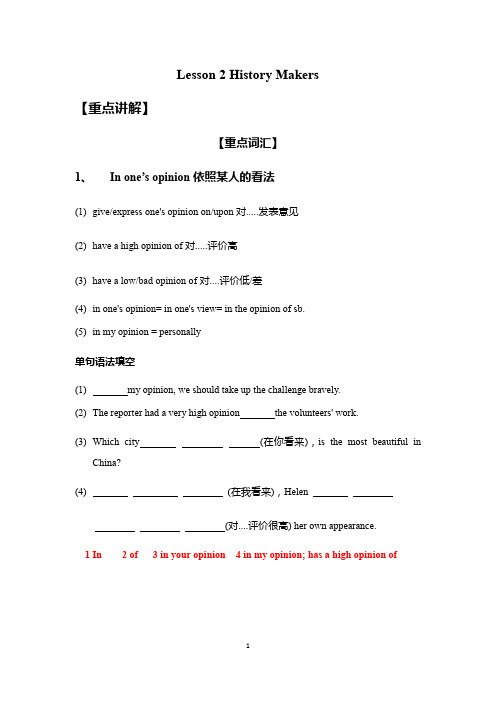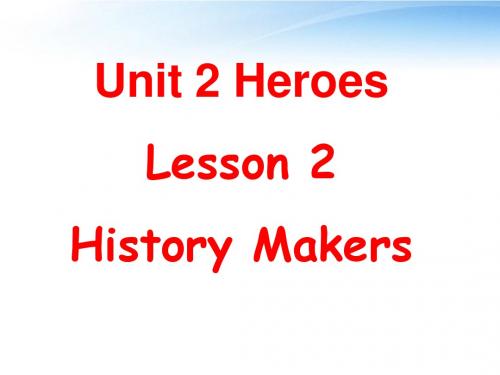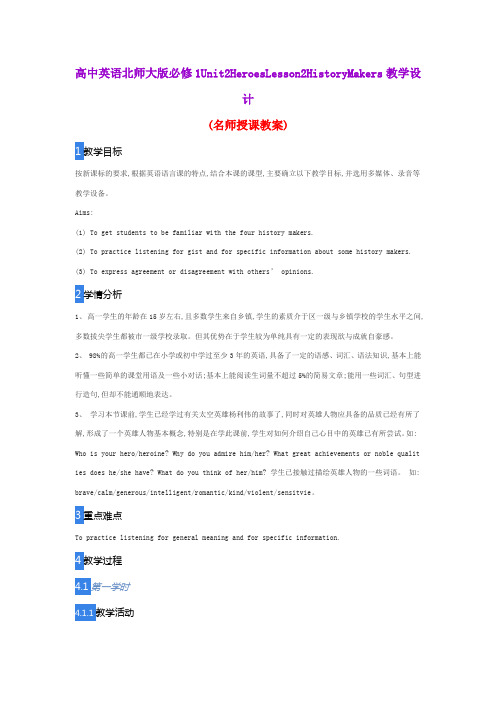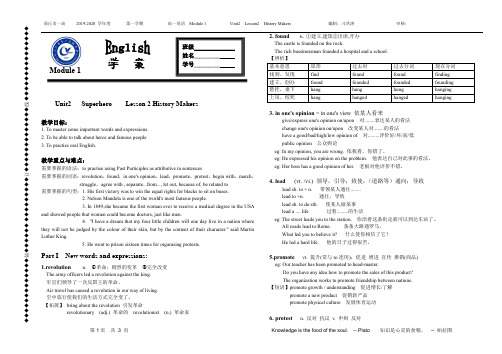北师大版英语必修一unit2lesson2historymakers (3)
unit2 lesson2 History Makers教学课件【北师大必修1】

Expansions
QUOTE…UNQUOTE
• “I have a dream that my four little children will one day live in a nation where they will not be judged by the colour of their skin, but by the content of their character.” Martin Luther King
Martin Luther King, Jr.
civil rights movement
I have a dream
A brief introduction
• Nelson Mandela • the first black Presi dent of South Africa • 27 years in prison • Nobel Peace Prize (1993)
buses. T 4. He went to prison sixteen times for organising protests. F
Listening
Exercise 5
5. He organised a march to Washington in 1963. T
6. He made a famous speech there beginning with the words: “I have
⑵ agree with sb / sth
同意、赞成某人的看法、见解;与…一致,适合
⑶ agree to同意、赞同某人的看法、见解(后接suggestion, plan,
decision, opinion等)
⑷ agree on…表示在某一点上达成协议
北师大必修一Unit2Lesson 2 History Makers精讲【有答案】

Lesson 2 History Makers【重点讲解】【重点词汇】1、In one’s opinion依照某人的看法(1)give/express one's opinion on/upon对.....发表意见(2)have a high opinion of对.....评价高(3)have a low/bad opinion of对....评价低/差(4)in one's opinion= in one's view= in the opinion of sb.(5)in my opinion = personally单句语法填空(1)my opinion, we should take up the challenge bravely.(2)The reporter had a very high opinion the volunteers' work.(3)Which city (在你看来),is the most beautiful inChina?(4)(在我看来),Helen(对....评价很高) her own appearance.1 In2 of3 in your opinion4 in my opinion; has a high opinion of2、found v (1)创建,创办; (2)建立,创立教材原句He led the 1911 revolution and founded...他领导了辛亥革命,并建立了...要点found sth. on sth. 把建立...的基础上be founded on..建立....的基础上词语积累founder n.创办者,发起人foundation n.基础,地基写出句中found的含义(1)The People's Republic of China was founded on Oct. 1, 1949.(2)I found this lifestyle relaxing.(3)They will found a school named after the hero.单句语法填空(4)The business, (found) by Mr Smith, has suffered a great loss.(5)The criticisms on belief (found) on facts as well as on belief.(6)(found) in the early 20th century, the school keeps on inspiring(鼓舞)children’s love of art.1 建立成立2 发现认为3 创建4 founded5 are founded6 Founded3、agree with(1)同意,焚成; (2)与......相符; (3)...适合(某人)要点必记(1)agree with sb.同意某人某人的观点(2)agree to one's suggestion同意某人的建议(3)agree on sth. 就...取得一致意见(4)agree to do sth. 同意做某事单句语法填空(1)Most of them don't agree his opinion.(2)I don't suppose the food here agrees me.(3)The manager, making it clear to us that he didn't agree us, left the meetingroom.(4)Jay phoned me this morning, and we agreed a time and place to meet.(5)He agreed (take) up the job in the remote area to teach little kids.(6)To tell the truth,I don't (同意他的建议).(7)The lifestyle here (不适合我).①with ②with ③with ④on ⑤to take⑥agree to his suggestion ⑦doesn't agree with me4、personally adv.(1)亲自地; (2)就自己而言◆教材原句I agree with you, but personally, I think Martin Luther King is alsoimportant, because he fought quite racism...我同意你的看法,但就我个人而言,我认为马丁●路德●金也很重要,因为他反对种族主义.....person n.人;个人in person亲自(=personallypersonal adj.个人的;私人的personality n.个性;人格单句语法填空(1)I'll deal with the urgent document (person)(2)(person) , I don't like the film we saw today.(3)I have talked to him on the telephone person.(4)At the moment,I have some (person) affairs to see to.(5)She found that (person) had a major effect on learning.(6)I agree with most of what you said, but (就个人而言), I preferJohn's plan.(7)(就我个人而言),I don't suppose the talk show is a success.①personally ②Personally ③in④personal ⑤personality ⑥personally ⑦personally5、equal adj.平等的,相等的;能胜任的◆要点:equal:平等的相等的(1)be equal to sth.与....相等(2)be equal to sb.与....平等(3)be equal to (doing) sth. 胜任(做)某事(4)be equal in sth.在某方面相同(5)without equal无与伦比(6)equal sb.in sth.在某一方面比得上某人equally adv.平等地单句语法填室(1)Lucy would be equal the task of running such as a company.(2)No one of us can equal him intelligence.(3)I hope that he proves equal the challenge.(4)Anyone, whether he is an official or a bus driver, should be(equal) respected.①to ②in ③to ④equally6、struggle (1)斗争,奋斗(2)搏斗,拼搏◆要点(1)struggle to do sth.努力做某事(2)struggle for为.....斗争(3)struggle against/with与...作斗争(4)struggle to one's feet挣扎着站起来单句语法填空(1)She’s struggling(support) a family alone.(2)He has been struggling sickness over the years.(3)When I turned around,I saw him struggling his feet.翻译句子:他花了10分钟才挣扎着站了起来。
高中英语 Unit2 Lesson2 History Makers课件 北师大版必修1

Tomas Edison invented the light bulb, moving picture camera and many other thing
Mother Teresa --- worked to help the poor in India
Ex. 2: Listen to students talking about the people in the photos. Complete the Function File with these words. agree, think, you’re right, don’t agree, in my opinion, personally Check the answers: (1) think (2) don’t agree (3) In my opinion (4) you’re right (5) agree
(F) 7. He received the Nobel Prize in 1965. (T) 8. A white extremist killed him in 1968.
Pronunciation: Stress Listen to the sentences and underline the stressed words. 2. Martin like Gandhi’s ideas about peaceful protest. 3. He organized a march to Washington. 4. A white extremist killed him.
(6) Personally
Ex. 5: Listen again and decide if the sentences below are true (T) or false (F): (T) 1. Martin Luther King was from the United States. (F) 2. Martin’s first experience of racism was with a bus driver. (T) 3. His first victory was to win the equal rights for the blacks to sit on buses. (F) 4. He went to prison sixteen times for organizing protests. (T) 5. He organized a march to Washington in 1963. (T) 6.He made a famous speech there beginning with the words: “I have a dream that…”
高中英语北师大版高一上册《Unit2Heroes Lesson2 History Makers》课件

【误区警示】 found (建立)—founded —founded find (发觉)—found —found 注意区分两个单词的过去式和过去分词。
写出句中 found 的含义
(1) The People’s Republic of China was founded on Oct. 1,1949. _________________
His first victory was to win the equal rights for blacks to sit on buses. 他的第一次胜利是为黑人赢得了坐公交车的同等权。 【要点必记】 (1)be equal to sth. /sb. 与……相等/ 同等 be equal to(doing) sth. 胜任(做)某事 be equal in sth. 在某方面相同 without equal 无与伦比 equal sb. in sth. 在某一方面比得上某人
单句写作
(6) [辞汇复现]In my opinion,he doesn’t meeting our demands.
(好像胜任)
【要点必记】 struggle to do sth. 努力做某事 struggle for 为……斗争 struggle against/with 与……作斗争 struggle to one’s feet 挣扎着站起来
his feet.
单句写作
(4) Those who have lost their jobs
(努力支付)their bills.
(5) [辞汇复现] 起来).
(他花了10 分钟才挣扎着站
(6) He
(跟癌症作斗争) for three years.
句式 部分否定
高中英语北师大版必修1Unit2HeroesLesson2HistoryMakers教学设计

高中英语北师大版必修1Unit2HeroesLesson2HistoryMakers教学设计(名师授课教案)1教学目标按新课标的要求,根据英语语言课的特点,结合本课的课型,主要确立以下教学目标,并选用多媒体、录音等教学设备。
Aims:(1) To get students to be familiar with the four history makers.(2) To practice listening for gist and for specific information about some history makers.(3) To express agreement or disagreement with others’ opinions.2学情分析1、高一学生的年龄在15岁左右,且多数学生来自乡镇,学生的素质介于区一级与乡镇学校的学生水平之间,多数拔尖学生都被市一级学校录取。
但其优势在于学生较为单纯具有一定的表现欲与成就自豪感。
2、 98%的高一学生都已在小学或初中学过至少3年的英语,具备了一定的语感、词汇、语法知识,基本上能听懂一些简单的课堂用语及一些小对话;基本上能阅读生词量不超过5%的简易文章;能用一些词汇、句型进行造句,但却不能通顺地表达。
3、学习本节课前,学生已经学过有关太空英雄杨利伟的故事了,同时对英雄人物应具备的品质已经有所了解,形成了一个英雄人物基本概念,特别是在学此课前,学生对如何介绍自己心目中的英雄已有所尝试。
如: Who is your hero/heroine? Why do you admire him/her? What great achievements or noble qualit ies does he/she have? What do you think of her/him? 学生已接触过描绘英雄人物的一些词语。
如: brave/calm/generous/intelligent/romantic/kind/violent/sensitvie。
北师大版高一英语必修一 Unit2Superhero Lesson 2 History Makers学案

商丘市一高 2019-2020 学年度 第一学期 高一英语 Module 1 Unit2 Lesson2 History Makers 编制:刁洪涛 审核:◆◆◆◆◆◆◆◆◆◆◆◆◆装◆◆◆◆◆◆◆◆◆◆◆◆◆◆◆订◆◆◆◆◆◆◆◆◆◆◆◆◆线◆◆◆◆◆◆◆◆◆◆◆◆◆◆◆Unit2 Superhero Lesson 2 History Makers教学目标:1. To master some important words and expressions.2. To be able to talk about heros and famous people3. To practise oral English.教学重点与难点:需要掌握的语法:to practise using Past Participles as attributive in sentences需要掌握的词语:revolution ,found ,in one's opinion ,lead ,promote ,protest ,begin with ,march,struggle ,agree with , separate...from..., let out, because of, be related to需要掌握的句型:1. His first victory was to win the equal rights for blacks to sit on buses. 2. Nelson Mandela is one of the world's most famous people.3. In 1849,she became the first woman ever to receive a medical degree in the USA and showed people that women could become doctors, just like men.4."I have a dream that my four little children will one day live in a nation where they will not be judged by the colour of their skin, but by the content of their character." said Martin Luther King.5. He went to prison sixteen times for organising protests.Part I New words and expressions:1.revolution n. ①革命;剧烈的变革 ②完全改变The army officers led a revolution against the king. 军官们领导了一次反国王的革命。
最新版北师大高一必修1Unit 2精品教案2 History Makers
2 History MakersObjectives■To practise listening for gist and for specific information.■To express opinions and to agree or disagree with other people’s opinions.■To practise sentence stress.Resources usedCassette, library/reference sources on historymakers.Possible problems■Students may panic when listening to the tape the first time and try to understand every word. Emphasise that this is not necessary to complete the exercise successfully and remind them that they often listen for gist in Chinese.■Some students may find it difficult to hear the stresses in a sentence or a word. Regular exercises and ear training will help and will also raise awareness of stressed words in sentences in Chinese.BackgroundThomas Edison (born 1847) was one of the most famous inventors of modern times. During his lifetime, Edison acquired 1093 patents for his inventions which included the light bulb, the phonograph and the moving picture camera.He also made improvements to the telephone. This was a remarkable achievement for someone who had, at the age of 12, lost almost all his hearing. However, Edison did not let his disability stop him from achieving success as an inventor, manufacturer and businessman.Dr Sun Yat-sen (born 1866) holds a special place in the history of modern China. He is recognised by Chinese people everywhere as the “Father of the 1911 Xinhai Revolution”. Originally, a physician by training, Sun entered politics when he saw China being destroyed by weak rulers and Japaneseinvaders. In 1911, Sun successfully led a revolution which overthrew the Qing Dynasty. Shortly afterwards, he founded the Republic of China and tried making China into a strong and unified country.Routes through the material■If you are short of time, set some exercises for homework and omit Exercise 8.■If you have time, students can do more research about famous history makers and give short talks about one of them.■If you have two periods for this lesson, a suitable natural break is after Exercise 5.Language Power: pages 68?C69.ListeningBefore you startExercise 1■Before students start this exercise, ask them to look at the title of this lesson (History Makers) and of the previous lesson (Modern Heroes) and discuss what the differences and similarities are between heroes and history makers.■Students then look at the pictures and see if they can name the people and match them to the■Ask students to say what they know about any of these people and what they think of them.Listen to learnExercise 2■Play the cassette for students to listen first, before looking at the Function File. See how much students can remember from this first listening.■Students listen again and complete the Function File.Answers1. think2. don’t agree3. In my opinion4. you’re right5. agree6. personallyTapescriptStudent 1: Well, I think Mother Teresa is important, because she spent her whole life working with poor and sick people.Student 2: I’m sorry, but I don’t agree. In my opinion, Dr Sun Yatsen is very important. He led the 1911 revolution and founded the first republic of China.Student 3: Yes, you’re right, but I think Thomas Edison is important, too. He created so many machines and inventions that we still use today.Student 4: Yes, I agree with you, but I think Martin Luther King is also quite important, because he fought against racism and his actions changed American society.■In small groups, students discuss the people in the photos to decide which one they would nominate as “the person we most admire”. Encourage students to use the expressions in the Function File as they give their opinions and agree or disagree with each other.Exercise 3Key Wordsexperience, racism, equal, influence, struggle, victory, protest, march■ Students look at the Key Words and see if they can guess the meaning of some of the words from their knowledge of other words in English. Students can use the dictionary to check their guesses and find out the meaning of all the Key Words.■ Ask students to pronounce the Key Words. They can then check if their pronunciation was correct as they listen to the tape in Exercise 4.Exercise 4■ Read through the Listening Strategies with the students and ask them if they ag ree with them and if they use any of these strategies already.■ Encourage students to say what sort of listening texts and tasks they find difficult or easy and how they tackle them.■ Elicit what students think they will hear in the radio programme abo ut Martin Luther King and what they hope to find out.■ Play the cassette through once without pausing it. Then, encourage students to pool what they have understood on the cassette.Interviewer: Hello. In this week’s People’s Heroes, we hav e Dr Sam Roberts to talk about Martin Luther King. Dr Roberts, what was he like as a child, growing up in America?Roberts:Well, King was born on the 15th of January 1929 in Atlanta, Georgia. He was a smart boy but he often experienced racism. Once he and his black teacher were on a bus. The white driver told them to give their seats to two white people. King didn’t want to because he believed black and white people should enjoy equal rights. The driver was very angry with him and, in the end, King had to stand up.Interviewer: What did King do about racism at college?Roberts: He was influenced by Gandhi’s ideas about peaceful protest. In 1965, he organised a bus protest. Black people did not take the buses. After some struggle, blacks and whites were able to sit together on buses. It was King’s first victory. Interviewer: During the 1960s, there were terrible fights between blacks and whites in America. What did King do about this?Roberts: He mainly organised peaceful protests to win rights for black people, and he was put in prison seventeen times for that. In 1963, he organised a march to Washington DC and made his famous speech there. It started with the words “I have a dream ...” In 1964, King received the Nobel Peace Prize. It’s sad that he was killed in 1968 by a white man who hated black people. But he will always be remembered for what he did for black people in America.Exercise 5■ Students read through the sentences and predict what the answers are.■ Students listen to the cassette and see if their predictions are correct.■ As you check students’ answers, ask them to correct the false sentences and make them true Answers1. T2.F3.T4.F5. T6. T7. F8. TPronunciation: StressExercise 6■ Before listening to the cassette, ask students to listen andidentify the stresses in two or three sentences you say inChinese. Then say a sentence in English, e.g. “This lesson started at ten o’clock” and ask students to identify the stresses. Write the sentences on the board if necessary and underline the stressed syllables/words. Ask students which type of words are stressed (words that give important or new information such as nouns and verbs).■ Students read the four se ntences and predict where thestresses will occur in sentences 2?C4. They then listen to the cassette and see if they were correct. ■ Play the cassette again for students to repeat the sentences.■ If students ask whether the stress can be different, ex plain that this is the normal stress pattern in these sentences.Answers2 Martin liked Gandhi’s ideas about peaceful protest.3 He organised a march to Washington.4 A white man killed him.。
北师大版高中英语必修1Unit2Lesson2教案
Lesson 2 History MakersTeaching aims:To practise listening for gist and for specific informationTo express opinions and to agree or disagree with other people’s spinions.To practise sentence stressTeaching difficulties:To practise listening for gist and for specific informationTeaching Aids: computer and cassetteTeaching procedures:Ⅰ. Warming upT: History makers mean people make great contribution to human and society’s development.Now I give you some information and you guess who they are?Do the exercise 1.First give four sentences and ask student guess who they are?If students have some difficulties the teacher give their photos to match these descriptions with the photos.ⅡTalkAdd more information to make students interested( first ask students to talk about these famous people then teachers to add information)Sun Zhongshan:He is a history maker.He led the 1911 revolution and founded the first Republic of China.we called the city “the city of Zhongshan” in honor of him.Thomas Edison: invented the light bulb, the moving picture camera and many other things.He is a great inventor.He invented lots of things and changed the world a lot. His discoverieschanged and improved our life.Mother Teresa : worked to help poor people in India. She is one of the most successful women in the world.She won the Noble Peace Prize in 1979,said:"I touch the poor as touch the Jesus". Martin Luther King:He is a black man. He was born in 1929.He fought for the rights of black people inthe USA.He devoted his life to equality of the black. He won the prize ofNobel Peace.Are they history makers? Why?S:Teacher draw a conclusion: Yes, they actions did much to advance society. They make things so important that it will be recorded in the history book. They set examples to us.ⅢListen to learnHow to express agree and disagree?First ask students to express agree and disagree then read these wordsagree, think, you’re right, don’t agree, in my opinion, personallyDo the exercise 2Play the cassette for students to listen first, before looking at the Function File. See how much students can remember from the first listening.Students listen again, fill in the blanks with the key words .ⅣListeningRead through the Listening Strategies with the students and show students Key words to see if they can guess the meaning of these words.Ask students to pronounce the Key Words. One of purposes is that can then check if their pronunciation is correct as they listen to the tape. The other purpose is to remember these words to understand the radio Programme better.Do the exercise 5Students read through the sentences and predict what the answers are.Students listen to the cassette and see if their predictions are correct.As you check students’ answers, ask them to correct the false sentences and make them true.ⅤPronunciation: stressAsk students to read the four sentences and predict where the stressed will occur in sentences. They listen to the cassette and see if they were correct.Play the cassette again for students to repeat the sentencesⅥSpeakingGive students time to read about some famous people. They take turns to choose a hero and ask and answer three questions about their hero. Encourage students to use an interview approach.ⅦHomeworkWhat can you learn from the heroes introduced in this unit?Write down your views and explain them to your partner.。
北师大版必修一Unit-2-lesson2-History-Makers-教学设计
Unit2 HeroesLesson 2 History MakersPeriod2 listening一.Teaching aims1. Master the key words and expressions2. To practise listening for the main idea and for detailed information.3. Improve students’ listening skills.二.Teaching important and difficult points1.Master the key words and expressions2. Through listening , students can get the main idea and detailedinformation.三.Teaching methodsTask- based approach; listening; speaking四.Teaching aidsa blackboard; a computer;五.Teaching procedureStep1(1)Greetings(2)Read words in lesson 2 on page 107Step2 Lead-in(1) Teacher presents four pictures about history makers (Mother Teresa; Dr. Sun Yat-Sen; Martin Luther King; Thomas Edison) and ask students one question to think.aboutQ: How much do you know about them?(2) Teacher invites students to answer this question and after that introduces these four history makes briefly.Step3 Practice (Exercise 1)(1)Teacher asks students to look through exercise 1 and match the descriptions with photos.(2) Teacher invites students to check answers.1. D2. A3. C4. BStep4 Pre-listening(1) Teacher presents some words related to the listening.(2) Teacher asks students to read the listening strategies on page 24.Step5 While- listening(1) Teacher plays the recording for the first time and asks students to listen carefully to get the main idea.(2)Teacher plays the recording for the second time and asks them to fill the blanks as many as possible.(3) The third time for checking answers.(4) Teacher plays the recording for the last time and asks students to read the listening material following the recording.Step5 After- listeningHave a free talk about students’ heroes.SummaryHomeworkReview the words and reread the listening material.。
北师大英语必修一Unit 2 Heroes Lesson 2 History Makers(共21张PPT)
2. If possible, guess the answer.
3. Be careful! Don’t be nervous. You will not understand everything – try to get the general idea.
4. He went to prison sixteen times for organising protests.
5. He organised a march to Washington in 1963.
6. He made a famous speech there beginning with the words : “I have a dream…”
Edison
On October l8,1931,Edison died at the age of eighty-four at his home in Orange, New Jersey.
Several days later, the whole United States switched off its electric lights for one minute, in honor of the man whose discoveries had so changed and improved the life of people everywhere.
He organized a_m__a__rc__h__ to Washington D.C. and made
hisf_a_m__o_u_s__s_p_e_e_c_hthere.
He___r_e_c_e__iv_e__d__ the Nobel Peace Prize.
